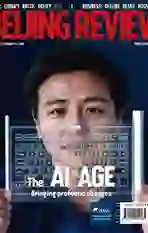What Should Today’s Poets Write About?
2018-03-06

Guo Lusheng, a renowned poet popularly known as Shizhi, has an important place in the Chinese poetic circle, regarded as the founder of the “misty” genre of Chinese poetry. Yu Xiuhua, a new member of this circle, came from a farming background. Yu, who has had cerebral palsy since childhood, has endured untold suffering in her life. Her poems, however, are now well received by Chinese readers, and have been bestsellers in recent times. Though both are remarkable poets, Shizhi and Yu did not have any interaction until recently, when he openly criticized her at a book launch.
In a recent public speech, Shizhi denounced Yu writing that to her, “an ideal life was to drink coffee, read and talk, and do similar leisurely things.” Shizhi scathingly said that Yu has forgotten that a poets responsibility is to think of the nation and mankind. In Yus case, he said her responsibility was to write about the pain and misery of ordinary farmers and their pursuit of a better life. In reply, Yu vehemently claimed that Shizhi was insulting others because of his elevated position in the poetic circle.
The public and media have reacted strongly to their altercation, with different people taking different views.
A brave voice
Tang Shan (Beijing Youth Daily): In his remark, Shizhi expressed his concern for the future of vernacular poetry, arguing that poems should refl ect the life of the masses and the nature of a nation. He expressed his dissatisfaction with Yu Xiuhuas way of life, instead of her work.
Shizhi is not commenting on readersindifference to culture, but is explaining the many problems that vernacular poetry faces. This shows his bravery and sense of responsibility. Its a pity that not many such voices are heard these days. Many people misunderstood Shizhis concerns.
The kind of anxiety embedded in Shizhis criticism has been there since the birth of Chinese vernacular poetry which is much different from the classical style, plaguing poets for generations.
Chinese society is heading toward diversifi cation, so its natural to hear different voices. As long as these voices do not distort the facts or exaggerate, they should be shown tolerance. Shizhi could have chosen to keep silent, but he did not. He expressed his worries over the current situation and over the future of vernacular poetry. Even if he is unable to provide a solution, his appeal and introspection are still of signifi -cance to Chinese vernacular poetry.endprint
Poets should be free
Wang Xiaolei (blog.sina.com.cn): Even though Yu is a poet now, in Shizhis mind, she is, first of all, a farmer. Maybe even he himself has not realized yet that he looks at Yu from the perspective of class and identity and then concludes that as a farmer poet, Yu should write this but not that. This is an outdated way of thinking. Its a shame that a modern poet thinks in this way.
Besides, is there any rule that a farmer poet must write about the misery of farmers lives and their desire for a better life?
In this kind of thinking, its taken for granted that everyone from a certain class must dress, speak and act in the same way, and even their dreams should be similar. Therefore, a farmer poet must focus on the efforts to achieve a better life, instead of talking about leisure in the afternoon sunshine.
Of course, writing about things closely related to ones life will provide more depth to the writing than if those things were from another background. However, there is no fi xed rule that forbids poets to touch upon topics that are not so relevant to their own backgrounds.
Lets come to Yu Xiuhua. What is the kind of misery that she focuses on? What is the kind of life she longs for? I personally fi nd that her poems refl ect the kind of misery she feels as a woman, and I dont think there is anything wrong with that. Her sentiments expressed in her latest poems are a far cry from what farmers are supposed to care about, but its not a fault. As a woman, she is totally entitled to care about femalecentric topics.
Not every poet is obligated to write about the fate of the nation or even mankind. Those who write about womens sentiments and feelings are by no means inferior to those who write about lofty things like mankind and the nation.
Reasonable criticism
Tan Kexiu (www.ifeng.com): Shizhi shot to fame because of his talent, not because of his personal situation, and critics have always praised his work. By contrast, Yu Xiuhua became well-known due to her personal situation becoming known to the public. Its readersrecognition that makes her what she is today. Seldom does she get plaudits from a fi rst-class critic.
Shizhis criticism of Yu is not as bad as some have said and denounced. In the world of modern poetry, poets are free to choose the topics they are really interested in, rather than writing about mankinds fate and the nations future. Yu became popular as a farmer poet. The public was moved by the kind of melancholy she tried to project through her revelation of the many dark or dull sides of their society in her poems. Today, she has shaken off the farmer poet label and thats why these problems have arisen.endprint
